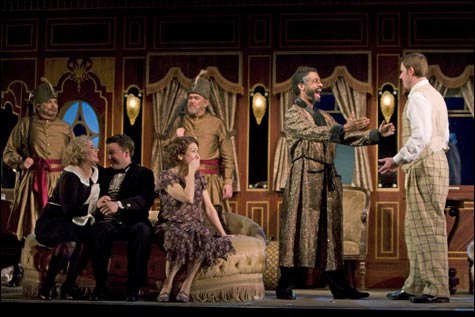
THE ABDUCTION FROM THE SERAGLIO: What kind of harem is located aboard the Orient Express? |
Last Friday’s Boston Globe Arts & Performance section devoted (wasted?) an entire page to color photos of the set designed in 2002 by Allen Moyers (who’s not mentioned) for Mozart’s Die Entführung aus dem Serail (“The Abduction from the Seraglio,” or in plainer English, “The Harem Rescue”) — a production shared by six opera companies including Boston Lyric Opera, whose current English-language revival is at the Shubert Theatre through May 6. It’s an expensive, elegant set, a lovingly detailed theatrical reproduction of railway cars on the Orient Express, the famous train connecting Paris and Istanbul. It would be a terrific set for Murder on the Orient Express or some spy story.
But it doesn’t serve Mozart’s youthful masterpiece of farce and high-minded ethics. The best comedy is based on logic so absolute it becomes absurd; the more seriously the characters take their plight, the funnier the ramifications. But putting on a train an opera about a Spanish nobleman trying to rescue his lady from a harem forces it into a false absurdity. Belmonte’s repeated question — “Is this the Pasha Selim’s house?” — makes no sense. (In 1991, BLO had the equally cockamamie idea of setting Rossini’s Cinderella opera on a boat.) We should be feeling the danger of characters in a powerless position. Can the Pasha’s threats to execute the lovers carry any weight if they’re en route to Paris? The elaborate rescue scene itself, a long stretch without any music, is one of the production’s few dead spots.

Let’s get the worst over with. The aspect of James Robinson’s stage business that drives me crazy (as it did in BLO’s L’elisir d’amore earlier this season) is that he doesn’t trust the music. At the most inopportune times, someone is invariably distracting us from what should be our center of attention. The most moving moment in the opera is Konstanze’s great aria “Martern aller Arten” (“Torments unrelenting” in the Andrew Porter English translation BLO uses), in which she heroically refuses to capitulate to the Pasha’s threats — which here consist of silks, furs, jewels, and perfume! While she’s singing about facing death, Osmin, the Pasha’s harem keeper, enters with a large hookah, and Konstanze’s servant, Blonde, pours Konstanze’s leftover champagne into her own glass and chug-a-lugs it during the long climactic high note. Can this be the right place for an easy laugh?
Since Mozart’s glorious score is sung here by an excellent cast under a stylish conductor, gimmicks and half-baked “conceptions” are especially unnecessary. The real star is not the set but Met soprano Mary Donleavy (in her first BLO appearance since her glowing Pamina back in 2000). Her big, warm voice is up to Mozart’s heaviest demands, which include two of his most challenging arias back to back. Early on, the fiendish high notes were, though accurate, too loud and shrill; but by “Martern aller Arten” (not quite as high), everything sounded round and juicy. And she’s a convincing and sympathetic actress. As Blonde, soprano Amanda Pabyan, a BU grad who made her Met debut as Mozart’s Queen of the Night, has impressive vocal chops (including a solid high E) and lively comic timing. But Blonde is supposed to be British, and Pabyan’s accent was more Brighton, Massachusetts, than Brighton, England.
The best Belmontes caress every lyric note. Norman Reinhardt has a pleasant voice, but he sings as if he were worried about an audition. Tenor Timothy Oliver was clearly enjoying the lighter role of Pedrillo. (Where else in opera is there such a gorgeous quartet for two sopranos and two tenors?) Another BU alum, bass-baritone David M. Cushing, was an audience favorite as the comic villain Osmin (his most substantial role with BLO). In tails and amply padded pantaloons, he had fun with director Robinson’s antics, and he negotiated all the sub-basement notes. But Mozart’s music adds dimensions of menace and heartbreak to the stereotype that Cushing never suggested. Actor Jim Spencer gives stiff dignity to the speaking role of the Pasha, but his high-pitched voice seems inappropriate for a man of power.
Willie Anthony Waters, artistic director of Connecticut Opera, and one of the world’s few African-American opera conductors, delivered sparkle and tingle, and his sure pacing went a long way toward counteracting Robinson’s lack of musicality.
Not all “concepts” are misguided. Take Sharon Daniels’s staging of Rossini’s Il barbiere di Siviglia (“The Barber of Seville”) for the BU Opera Institute. The student singers and orchestra under William Lumpkin ranged from fine to exciting. Italian diction was clearer than the BLO’s English. The simple two-level set was elegant. Daniels’s inspired idea to revivify this over-familiar work was to update old Seville to Franco’s Spain in the 1950s. Meanwhile, pale 18th-century “ghosts” of the five major characters hover in the background, sometimes still as statues, but at crucial moments pulling the (literal) strings of the “living” characters. Barbiere usually isn’t about anything other than the fun of doing it; here it was also about the relation between “real life” and “operatic tradition.” Amid all the hilarity (which included a stunning first-act finale involving hula hoops, careering spotlights, and characters dancing the Charleston and the twist) was something chilling — and moving. Daniels revealed dimensions inherent in the music that few productions attempt to explore or realize.